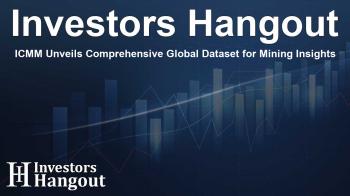ICMM Unveils Comprehensive Global Dataset for Mining Insights

ICMM Introduces a Groundbreaking Mining Dataset
In a significant advancement for the mining industry, ICMM has launched its Global Mining Dataset, the most comprehensive compilation of mining and metals facilities available to the public. This ambitious project encompasses over 15,000 mines and processing centers, spanning 47 primary commodities worldwide. The Dataset aims to elevate the quality and accessibility of crucial sector information, which is essential for informing policy and fostering discussions about sustainable practices in mining.
Key Insights from the Dataset
Several key findings have emerged from this inaugural Dataset:
- The mining industry is distinctly global, yet its distribution is not uniform. Notably, countries like China, Australia, and the USA collectively host about 45% of all mining facilities.
- The types of commodities represented reveal a market heavily focused on coal, gold, copper, and iron ore. Specifically, coal mines alone account for 43% of the facilities documented in the Dataset.
- Interestingly, metal mining often takes place in separate regions from extraction processes. China stands out as the leading nation in terms of metallurgical facilities, boasting 426 in total.
Addressing Data Gaps
As global demand for minerals and metals surges, particularly to support the energy transition and overall sustainable development, the need for reliable data has never been more pressing. Systemic issues regarding data quality have hindered the capacity of policymakers, investors, and civil society to make informed decisions and regulations regarding the mining sector's impact.
Transforming Mining Data
The first major step in this transformative initiative has been the development of a detailed report titled 'Global Mining Dataset: Understanding the global distribution of mining and metals facilities'. This report identifies the locations and outputs of mines, smelters, refineries, and processing plants worldwide. Collaborators like Accenture and Global Energy Monitor provided significant support in compiling the information.
Quotes from Industry Leaders
Rohitesh Dhawan, President and CEO of ICMM emphasizes the Dataset's importance, stating, "ICMM's foundational Dataset reveals that more than 75% of national economies have a tie to large-scale mining or mineral processing. A global perspective on facility location, type, and commodity is key to informing critical public and policy discussions."
Echoing this sentiment, Janez Poto?nik, Co-Chair of the International Resource Panel, remarked, "Reliable, transparent data on the mining sector is essential for evidence-based policymaking and achieving sustainability targets globally. ICMM's efforts are a crucial step toward this goal."
Dr. Emma Gagen, Director of Data and Research at ICMM, outlines the challenges presented by existing data, which often lacks completeness or consistency. She states, "Transforming the information landscape around the mining sector is not a solitary task. We invite global partners to aid us in enhancing data quality and filling existing gaps."
Implications for the Future
Acknowledging the inherent limitations of the Dataset, it serves as a starting point rather than a definitive assessment of mining facilities' numbers worldwide. The Dataset presents a significant step towards understanding the intricate landscape of mining operations which, as noted, is crucial given the growing global emphasis on resource management and environmental sustainability.
About ICMM
ICMM, which stands for the International Council on Mining and Metals, represents about a third of the global mining industry. The organization aims to lead sustainable development within the sector by establishing principles that govern responsible mining practices. Through collaborative efforts, ICMM works diligently to set standards for producing minerals and metals that contribute positively to society.
Frequently Asked Questions
What is the Global Mining Dataset?
The Global Mining Dataset is a comprehensive compilation of mining and metals facilities that provides critical information about their locations and outputs.
Why is this Dataset important?
It helps overcome longstanding data quality issues, enabling policymakers and industry players to make informed decisions regarding sustainable practices.
Who developed the Global Mining Dataset?
The Dataset was developed by ICMM with support from organizations like Accenture and Global Energy Monitor.
What insights does the Dataset provide?
It offers insights into the distribution of mining facilities and highlights major commodities, showing where significant mining activity occurs globally.
How can this Dataset impact future mining policies?
The Dataset's detailed information can guide more effective regulations and policies, ensuring that the mining and metals sector contributes positively to sustainable development goals.
About The Author
Contact Addison Perry privately here. Or send an email with ATTN: Addison Perry as the subject to contact@investorshangout.com.
About Investors Hangout
Investors Hangout is a leading online stock forum for financial discussion and learning, offering a wide range of free tools and resources. It draws in traders of all levels, who exchange market knowledge, investigate trading tactics, and keep an eye on industry developments in real time. Featuring financial articles, stock message boards, quotes, charts, company profiles, and live news updates. Through cooperative learning and a wealth of informational resources, it helps users from novices creating their first portfolios to experts honing their techniques. Join Investors Hangout today: https://investorshangout.com/
The content of this article is based on factual, publicly available information and does not represent legal, financial, or investment advice. Investors Hangout does not offer financial advice, and the author is not a licensed financial advisor. Consult a qualified advisor before making any financial or investment decisions based on this article. This article should not be considered advice to purchase, sell, or hold any securities or other investments. If any of the material provided here is inaccurate, please contact us for corrections.

